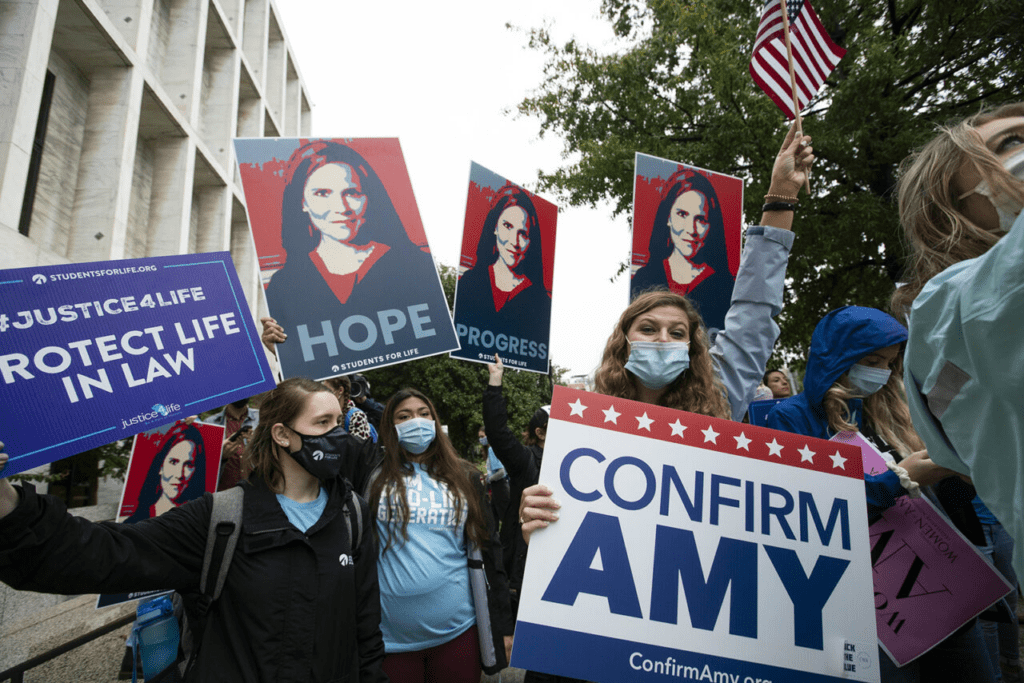Welcome to the Democracy Brief. Check out this week’s episode of Winter is Here where RDI’s Board President, Senator Heidi Heitkamp, sits down with Uriel Epshtein for a conversation on a perceived urban-rural divide and the impact it has on democracy in the US and around the world.
More
Now back to the Supreme Court.
On a January day in 1973, the justices of the Supreme Court announced in Roe v. Wade that the Constitution guarantees a right to abortion. Then last Friday, a different set of Supreme Court justices announced in Dobbs v. Jackson Women’s Health Organization that the Constitution actually says no such thing.
The laws they’re reading haven’t changed. What has is the political lean of the court, and it hardly happened accidentally. No one can mistake that judicial nominations have become a partisan bloodbath, and Republicans, through good luck regarding the timing of vacancies and political hardball, outmaneuvered the Democrats.
Sen. Mitch McConnell’s years-long campaign to pull the Supreme Court to the right has been extremely successful, and it’s wreaking havoc on the public standing of the Supreme Court. New Gallup polling from last week puts public confidence in the Supreme Court at just 25 percent, the lowest ever recorded.
Two weeks ago, I wrote that our elections are in a crisis of legitimacy that threatens Americans’ willingness to respect their results. Throw the Supreme Court in there too.
The Destruction of Perceived Independence
The Dobbs decision is the result of partisan wrangling that transformed the Supreme Court from America’s most trusted, politically ambivalent institution into one that appears solidly in the grasp of a single party.
That process of politicization is long and unmistakable, but it went into overdrive in 2016 when then-Senate Majority Leader Mitch McConnell refused to host hearings for Obama’s final nominee to the Court, Merrick Garland. President Trump went on to appoint Neil Gorsuch and Brett Kavanaugh to the bench. Then in the final months of Trump’s presidency, McConnell reversed on the precedent he fabricated to deny Garland a hearing and rammed Amy Coney Barrett through a last-minute confirmation process. If there was any decorum left in the Supreme Court nomination process, it died in October of 2020.
To be clear, the Supreme Court was never truly politically independent. The Court gave itself the power of judicial review—so central to its role today—because Chief Justice Marshall refused to recuse himself from a case in which he was personally involved, that involved the judicial appointment of his brother, and that allowed him to spite Thomas Jefferson, whom he personally disliked. Justice Thurgood Marshall famously described his legal philosophy as “you do what you think is right and you let the law catch up.” And in 2000, the Supreme Court delivered the presidency to Bush by ordering an end to the Florida recount. It asked that later court proceedings don’t draw on the decision as precedent, an exceptional and bizarre stipulation for a supposedly legally-sound decision. Justice Scalia, who voted with the majority to end the recount, reportedly described the decision in private as “a piece of shit.” The court has never really been independent of politics, but neither has it been so publicly and successfully pulled to one side by a political party.
Now that Roe is gone, the partisan celebrations have begun. Trump said that the Court’s decisions overturning Roe and other cases “were only made possible because I delivered everything as promised.” McConnell said on Wednesday that he thinks affecting the political lean of the Supreme Court is “the most consequential contribution I’ve been able to make to my country in the course of my career.”
It is difficult to reconcile that Republicans are taking credit for orchestrating a Supreme Court decision and that the court is independent of politics. I don’t doubt that the justices are acting in accordance with their judicial philosophies, but the way they came to sit on the Court damages their perceived objectivity.
Roe was, according to many left-leaning legal experts including Ruth Bader Ginsburg, a flawed decision. It could reasonably be overturned, but not this way. Dobbs wasn’t solely a legal change for the sake of righting a past legal wrong, but also undeniably a change brought by a political party for the sake of achieving a policy outcome. The Dobbs decision reeks of political manipulation, and the architects of the new Court, McConnell and Trump, are telling us so.
Regardless of your stance on abortion, this is a problem. A Supreme Court that a large majority of the public lacks confidence in and a party takes credit for manipulating is a danger to democracy. At the moment, there’s little to do to fix that. While McConnell runs victory laps, how could Americans hear his words and then think of the judges as independent arbiters of the law?
The Legitimacy Crisis of a Partisan Court
Americans are entering a new period in the history of the Supreme Court, where its decisions will be met with greater skepticism than at any point in recent memory.
The Founders designed the Court to be above politics. The public would have no direct say in who sits on it, and terms would be for life. Political bodies, on the other hand, would be subject to frequent elections.
But the Supreme Court’s greatest strength—its independence from the electorate—put a target on it. If it could be manipulated, it would be the perfect institution for defending ideas falling out of favor with the majority of the country. Properly politicized, it could perpetuate an ideology for a generation with the electorate incapable of shifting course.
Of course, a politically motivated body with no checks and balances doesn’t appear democratic, particularly to those on the losing side. Black robes and secrecy can only lend you so much credibility. So in the eyes of progressives, the Supreme Court is now a problem to be solved.
Progressives’ calls to pack the Court are already reverberating, and they will grow louder. As of last year, a narrow majority of Democrats support expanding the Supreme Court and two-thirds think that doing so would make it more independent. Democratic politicians may start to run on promises to reform the Supreme Court as Republicans ran on platforms to support pro-life judges. If the Democrats pack the court, Republicans would never again consider it legitimate.
The justices know they are staring down a crisis. Last September, Justice Amy Coney Barrett bemoaned how the Supreme Court is increasingly seen as political. She explained that “to say the court’s reasoning is flawed is different from saying the court is acting in a partisan manner,” and that “judicial philosophies are not the same as political parties.”
She was speaking at the University of Louisville’s McConnell Center, introduced by the senator himself.





